

Uh oh...
It appears that you're using a severely outdated version of Safari on Windows. Many features won't work correctly, and functionality can't be guaranteed. Please try viewing this website in Edge, Mozilla, Chrome, or another modern browser. Sorry for any inconvenience this may have caused!
Read More about this safari issue.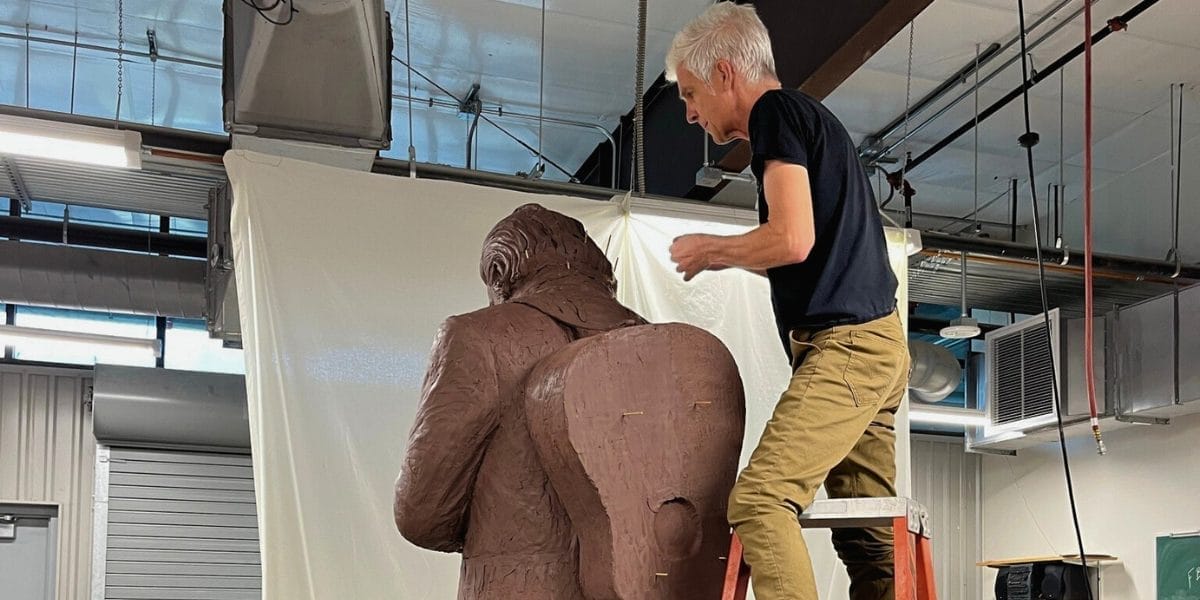

Almost five years ago, Governor Asa Hutchinson signed into law Act 581, calling for replacing the two statues in Statuary Hall in Washington, DC. He charged an appointment committee with asking hard questions of who and what stories most represent Arkansas today.
Daisy Bates was a quick and easy decision for her commitment to civil rights, equality and her family’s historical role in Arkansas’s history. Johnny Cash was selected as the second subject. Little Rock-based sculptor Kevin Kresse was chosen for Johnny Cash. Benjamin Victor, an Idaho-based artist already known in Statuary Hall, was selected to create the likeness of Daisy Bates.
Getting to know Kevin Kresse
Kevin Kresse is a masterful Arkansas artist, and his early exposure to art, drawing faces and studying human forms from an artistic perspective is probably one of the most significant factors in his sculpting success today. While most of his family works in medicine and science, he was busy drawing Batman and studying Michelangelo and da Vinci. They were his heroes and set a standard of excellence he always worked toward.
“When I went to college, the only way to make a living with art was to teach or work in advertising. So, I stepped into advertising and was working at the Arkansas Democrat-Gazette when they pulled everything from an agency. I was in the right place to move into the art director role and saw in my 20s a perspective many don’t have until they are in their 40s. I wasn’t sure I wanted to be there forever.”
The Kresses took a year off to backpack and tour Italy to evaluate what was next. “While in Italy, I studied my heroes. I visited their greatest works in person, and I was inspired.” Kresse came home and determined to make a profession as an artist.
Sculpting a Career
Kresse started painting and hosting gallery shows and taught a few courses at the Arkansas Arts Center, now the Arkansas Museum of Fine Arts.
For more education to enrich teaching, Kresse took a course at UALR in bronze casting and it opened his eyes to new possibilities. So, he kept practicing and working on developing pieces from his mind. A friend asked him to create a sculpture for their construction business and home and his awareness expanded.

With over 10 years of public art experience, he’s created several pieces Arkansans may recognize:
- Compassion and Hope | Little Rock, Baptist Health
- Breaking the Cycle | Little Rock, Riverfront Park
- Storytime | Little Rock, CALS
- The Family | Little Rock, Two Rivers Park
- St. Fiacre | North Little Rock, St. Joseph Center
- General Darby | Fort Smith, along Garrison Ave.
- Mother Earth and Illuminato | North Little Rock, Argenta District
- John Cain murals | North Little Rock, 7th Street Project
- Levon Helm bust | Marvel
“Oh, my daughter and I go there every week to pray together. Knowing your art moves people is the greatest reward!” – Kevin Kresse
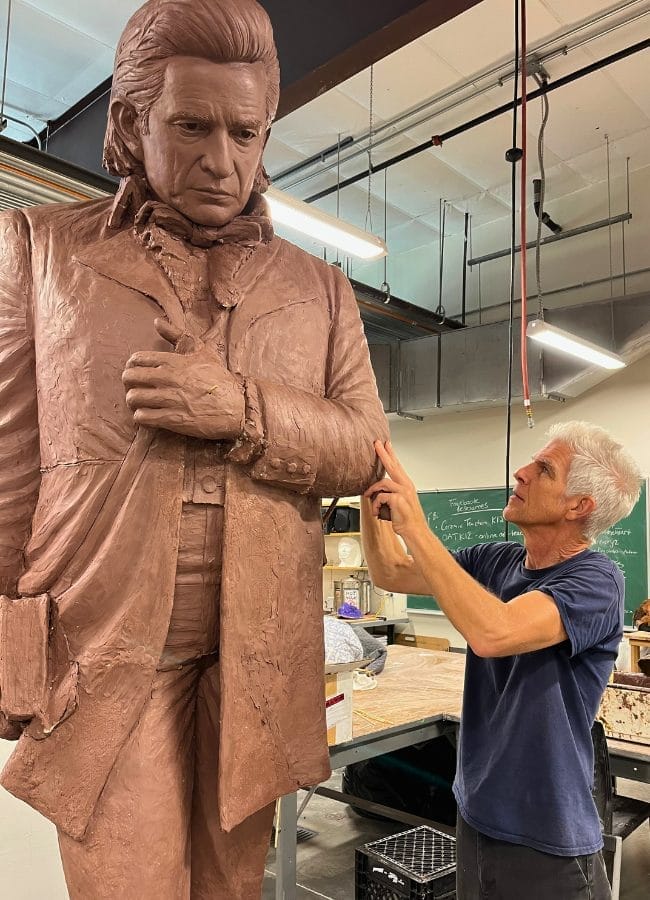
Walking with Johnny
“I’ve been working on a series about Arkansas musicians. I’m a songwriter but a terrible singer, so exploring Arkansas singers has been a pet project of mine. And we have many in our state. People show up at their childhood homes, and there is no likeness of them to tell their story. I did a project for Marvel or more specifically Turkey Scratch, to help celebrate the childhood home of Levon Helm. I was already working on something for Dyess about Johnny Cash.”
So, Kress submitted a thesis book and made the final three from more than 30 artist submissions. “I knew I needed to present the 1970s version of Johnny that we knew from television. I built a 3-foot model and went all in. I didn’t want to leave the process with any regrets.” And his “all in” mindset solidified him as the artist.
“It’s uncanny how he brought soul into this statue. Its startling and beautiful.” – Rosemary Cash
Through the statue, Kresse tells the story of Johnny Cash as the familiar figure we know from 1970s TV, standing on the porch of his restored home we see today in Dyess, right before he goes to play a concert at the Heritage Festival. His hand on his chest marks his gratefulness, and the look in his eyes notes his mind rolling back through history and the things he did and didn’t do.
“While researching Johnny, I felt like the public already knew the bad parts of his story, so as I got to know him, I got to know the great parts of his story as a philanthropist and the many things he did that were unknown and unspoken. I respect him and want to convey this aspect of the Man in Black to observers.”
Kresse selected a piece of limestone from a quarry in Eureka Springs to complete a whole Arkansas experience for his project. Currently, Kresse is back completing his bust sculptures of Arkansas musicians.
Learn more about Kevin Kresse and follow the progress of his collection.
Website | Media | Facebook | Instagram
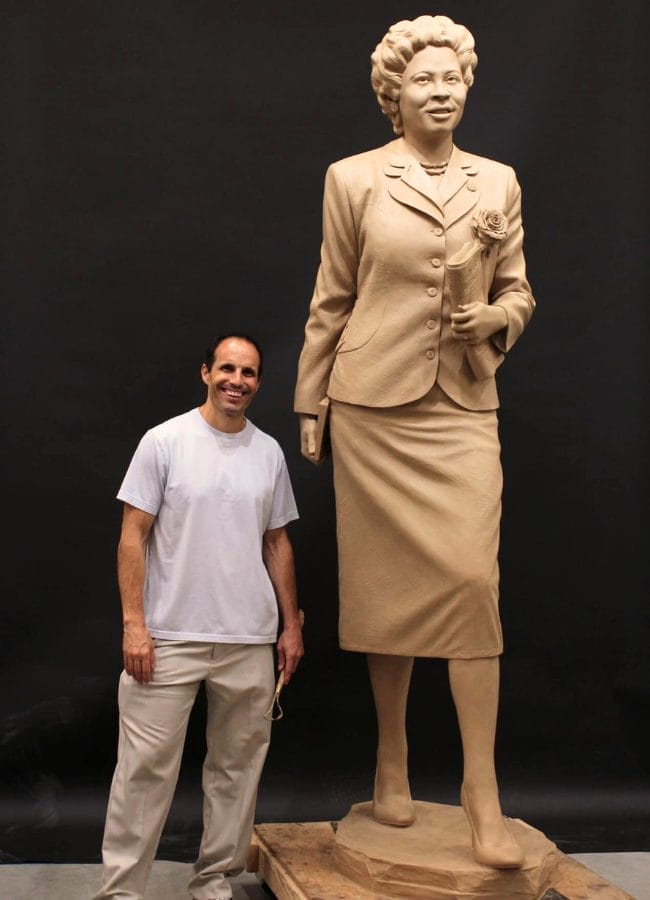
Stepping out with Daisy Bates
The selection committee also chose Benjamin Victor from Idaho to complete the statue of Daisy Bates, who feels such a solid connection to Mrs. Bates after reading her book, reading about her, meeting her friends and community members and sculpting her.
“Studying her life changed mine.” – Benjamin Victor
Victor let everything he knew about her tenacious and optimistic spirit unfold from the clay. To design his sculpture, Victor used things he noticed while touring her home and the descriptions in Janice Kearney’s book about Daisy Bates. Several symbols of her life and commitment to civil rights stand out for an observer. Mrs. Bates is standing with 1 foot forward to represent her leading the charge for the Little Rock Nine and cycle rights marches, where she was the only woman alongside Dr. Martin Luther King, Jr. and other civil rights leaders.
- Mrs. Bates wears a business suit, marking her role as a black business owner and the hardships she endured, continuing to tell the truth while losing funding and support.
- In her arm is clutched a journalist’s notebook and pen, ever committed to capturing Civil Right’s stories for all to read. Victor used a high-resolution photo from the Arkansas State Archives office to capture the details.
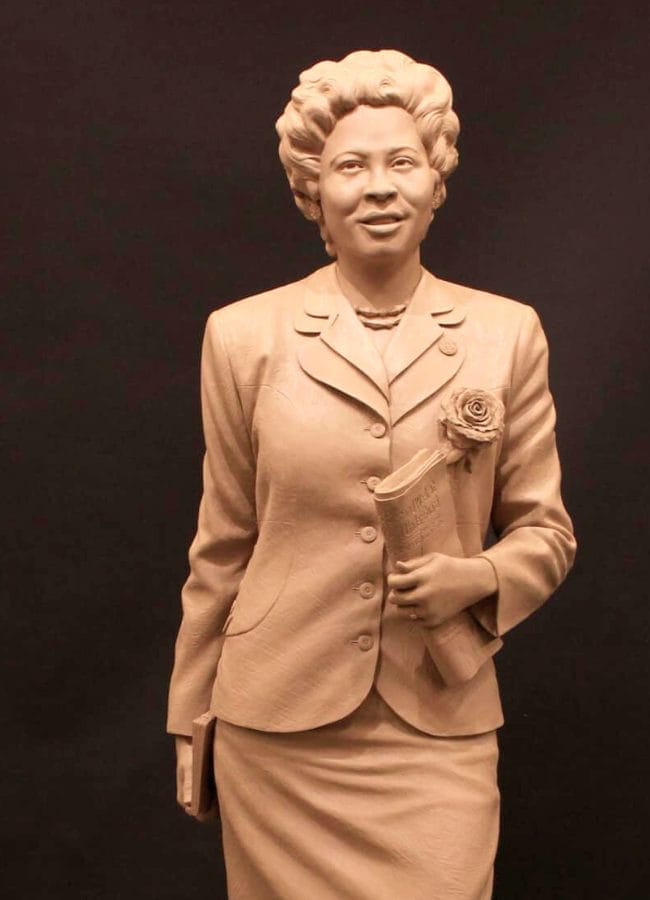
- In her hand is a rolled-up copy of The Arkansas Weekly, her newspaper dedicated to the Civil Rights movement. Victor used the paper’s headline and front cover to chisel every word as it appeared with a dated acknowledgment.
- Her earrings are daisies, and while she loved flowers, it took time for her to grow to like her name. This little notation captures her evolving spirit and beautiful name.
- On Mrs. Bates’s lapel are two pins. One pin is an NAACP pin she wore often as the president of the Little Rock Chapter. Near that pin is another blooming rose, teaching a lesson she learned in childhood of letting love overcome hate.
- Mrs. Bates wears a smile and looks up and outward, noting her optimism and desire to do everything with honor and truth, even when the subject is challenging.
“No man or woman who tries to pursue an ideal in his or her own way is without enemies.” – Daisy Bates
As I spoke with Victor, I found his voice caught a couple of times with emotion describing a woman he had only recently come to know but found so respectable and a champion for justice and truth. He hopes observers will pause and notice the quotes around the statue’s base. Once Daisy Bates’ statue is in the rotunda, he hopes her position near Jefferson Davis’s statue and stepping toward the Rosa Parks statue across the room will continue the bigger story of progress and change.
Both statues are completed and ready to be placed in Statuary Hall in the U.S. Capitol building, hopefully by April 2024.
Learn more about Benjamin Victor – Website | Facebook | Instagram | Current Project
Join the Conversation
Leave a Comment
One response to “Bates & Cash: New Statues at the U.S. Capitol”
 Leave a Reply
Leave a Reply
We do the work.
You check your email.
Sign up for our weekly e-news.
Get stories sent straight to your inbox!










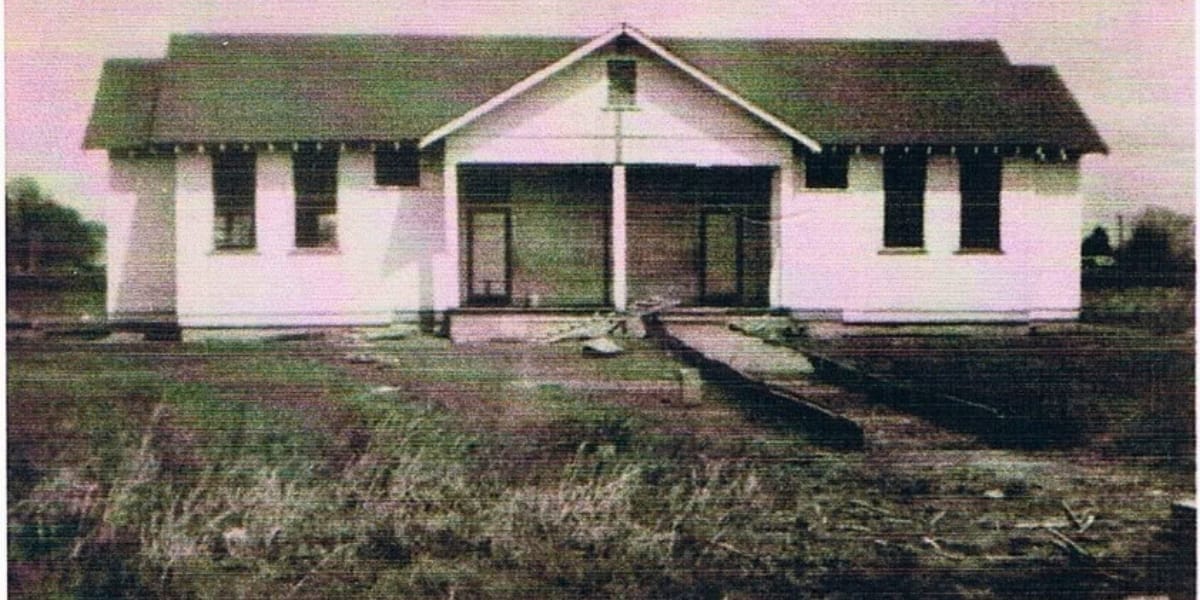

 Leave a Reply
Leave a Reply
[…] Today, his boyhood home in Dyess is open for tours through Arkansas State University. Additionally, a statue depicting him was recently added to Statuary Hall at the National Capitol to symbolize […]